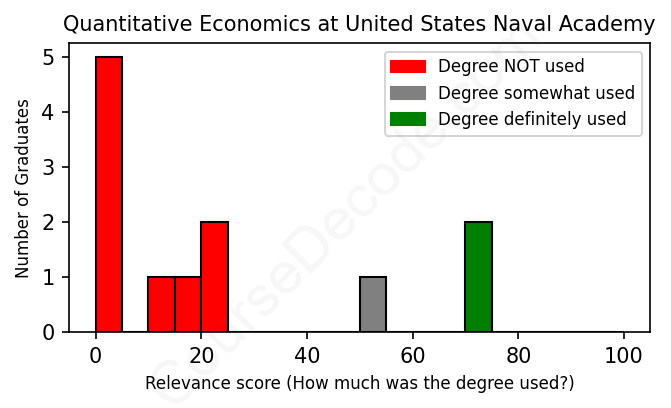
First, some facts. Of the Quantitative Economics graduates from United States Naval Academy we've analyzed , here's how many have used (or NOT used) their degree in their career:

These are estimates based on AI analysis of 12 LinkedIn profiles (see below).
The verdict? Horrible! Overall, with an average relevance score of 21%, Quantitative Economics graduates from United States Naval Academy have an exceptionally lower likelihood (-46%) of finding work in this field compared to the average graduate across all fields:
And for comparison, here's the chart for all profiles we've looked at across all degrees.
Also, after graduating, 50% of these graduates have pursued further education other than another Bachelor's degree (such as a Masters degree or other), compared to the average across all profiles of 35%. This suggests you may need more than just a Bachelors degree to be competitive as a Quantitative Economics graduate.
See the details:
|
Relevance score: 73% We think this person has gone into a career highly relevant to their degree. We think this person has gone into a career highly relevant to their degree.
DEGREE INFOGraduated in 2010 from United States Naval Academy with a Bachelor of Science (B.S.) in Quantitative Economics. No other secondary education since. JOB HISTORY SINCE GRADUATIONUSS McClusky (FFG-41), Oliver Hazard Perry-Class Frigate: 1st LT/Anti-Submarine Warfare Officer US Navy Jul 2010 - Jan 2013 USS Howard (DDG-83), Arleigh Burke-Class Destroyer: Damage Control Assistant  US Navy Feb 2013 - Sep 2014 Senior Field Marketing Director Midwest United States  United States Naval Academy Sep 2014 - Jun 2016 Operations Leadership Program Associate  Wells Fargo Securities Jun 2016 - Apr 2018 Prime Services Middle Office Analyst  Wells Fargo Securities Apr 2018 - Present ABOUTNo information provided. |
The top 10 most common jobs done by the graduates we've analyzed (ranked most common to least) are:
Looking at the career paths of graduates from the United States Naval Academy who studied Quantitative Economics, it's clear that many have taken positions related to military roles. A significant number have served as officers in various branches of the military, such as the Navy and Marine Corps. While these roles often emphasize skills like leadership, strategy, and operational management, they rarely tap into the core economic and analytical principles that graduates of Quantitative Economics typically learn. Most military positions, such as being an Infantry Officer or Damage Control Assistant, focus more on tactical planning and military operations rather than economic analysis.
However, there are exceptions. Some graduates have transitioned into roles in financial services and consulting, like working with Wells Fargo or McKinsey & Company, where their quantitative skills are directly relevant and utilized. Other roles, such as the General Manager position at ProPump, also draw on economic principles in areas like resource allocation and strategic planning. Overall, while a portion of these jobs can connect back to the skills learned in a Quantitative Economics program, particularly in finance and consulting, many of the predominant roles taken by these graduates are primarily military and do not leverage their economics training. So if you're thinking about this path, you might want to consider how much you actually want to use your economics knowledge in your future career.
Here is a visual representation of the most common words in job titles for Quantitative Economics graduates (this is across all Quantitative Economics graduates we've analyzed, not just those who went to United States Naval Academy):

Graduates from the United States Naval Academy with a degree in Quantitative Economics tend to follow a trajectory that often combines military service with progressively responsible roles in various industries. For many of them, the first job post-graduation is typically a commission in the Navy or Marine Corps, where they serve in roles like Engineering Division Officer, Infantry Officer, or any of the specialized positions aboard ships or submarines. The leadership training and discipline they gain during their military service can set a strong foundation for their careers, even if they eventually transition out of the military into civilian roles.
Five to ten years later, many of these graduates have transitioned into substantial positions in the private sector, often leveraging the strong analytical skills they honed in their economics program. For instance, roles at prestigious firms like McKinsey & Company and positions in operations and analysis at major financial institutions like Wells Fargo suggest that a good number of them are indeed landing careers related to their academic background. However, there are also those who seem to drift into unrelated fields, such as teaching or support roles. Overall, it appears that while some graduates find strong alignment between their degrees and their career paths, others may find themselves with varied experiences that don't directly link back to Quantitative Economics. Still, the leadership experience from military service generally enhances their employability and provides a unique perspective in their subsequent careers.
Getting a Bachelor's degree in Quantitative Economics at the United States Naval Academy can be pretty challenging, especially since the academy has a reputation for rigorous academic standards and a competitive environment. Quantitative Economics itself involves a lot of math and analytical skills, so expect to dive deep into statistics, calculus, and economic theory. While it might not be as tough as engineering or some of the more intense STEM majors, it definitely requires strong problem-solving skills and a solid commitment. Plus, balancing academics with the military training and responsibilities at the academy adds an extra layer of difficulty, so it might feel a bit more demanding than your average college experience.
Most commonly, in the LinkedIn profiles we've looked at, it takes people 4 years to finish a Bachelor degree in Quantitative Economics.
Looking at these graduates from the United States Naval Academy, it seems they’ve overall carved out pretty solid careers, though the money definitely varies depending on their paths. The ones who’ve gone into finance, like those at Wells Fargo and McKinsey, are likely making good bank, especially since these firms can pay six figures pretty quickly for associates. On the other hand, those who stayed in the military can still earn a decent salary, especially ranking up through the officer ranks, but their overall earnings may not compare to the high-flying finance jobs. The diverse paths show that even though they all started with a strong quantitative background, some have definitely hit the financial jackpot while others have opted for a more service-oriented lifestyle. So, they seem to be doing well enough, but it’s a mixed bag when it comes to big salaries!
Here is a visual representation of the most common words seen in the "about" section of LinkedIn profiles who have a Bachelor degree in Quantitative Economics (this is across all Quantitative Economics graduates we've analyzed, not just those who went to United States Naval Academy). This may or may not be useful:

Here are all colleges offering a Bachelor degree in Quantitative Economics (ordered by the average relevance score of their Quantitative Economics graduates, best to worst) where we have analyzed at least 10 of their graduates:
| College | Score | Count |
|---|---|---|
 United States Naval Academy United States Naval Academy
|
21 | 12 |